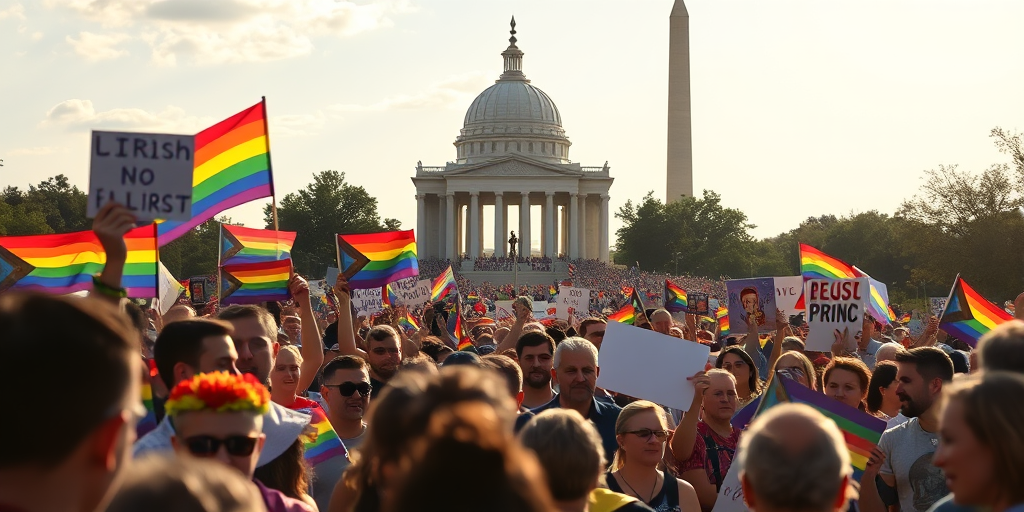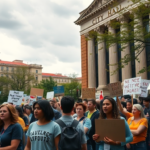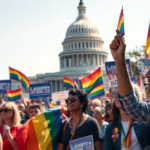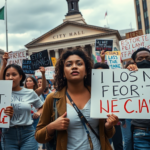**Trump’s Changing Stance on LGBTQ+ Rights: Community Concerns and Political Impacts**
When Donald Trump first ran for the presidency, he appeared as a unique voice among Republicans toward LGBTQ+ rights. This sentiment stemmed from his previous actions, such as allowing a transgender contestant in the Miss Universe pageant and appointing an openly gay individual to a Cabinet-level position. However, recent policy shifts during his current administration have placed him at odds with LGBTQ+ activists, who now consider him a significant threat to their rights.
**Early Promises vs. Recent Policies**
Initially, Trump was perceived as a Republican who might champion LGBTQ+ issues. His earlier actions and statements, like Caitlyn Jenner’s use of any bathroom at Trump Tower, fueled this perception. The appointment of openly gay figures such as Richard Grenell further solidified this image. However, Trump’s recent policies have drawn severe criticism. Activists, including Kevin Jennings from Lambda Legal, claim that the present climate under Trump is reminiscent of the struggles faced during the height of the AIDS crisis. They fear significant rollbacks on LGBTQ+ rights over the next four years, fostering an environment of uncertainty and unease.
Central to the controversy are Trump’s anti-transgender policies. His re-election agenda included imposing restrictions on transgender athletes and advocating for legislation that recognizes only two genders. Additionally, Trump signed an executive order prohibiting hormonal and surgical interventions for transgender minors. In the military, transgender individuals have been banned from serving, and the administration refrained from issuing a Pride Month proclamation.
**Local Impact and Community Reactions**
In the United States, these policies are met with diverse reactions from local communities. Groups like Lambda Legal have expressed deep concern regarding these developments. Kevin Jennings has vocalized fears about the negative consequences of such policies, stating, “We are in the darkest period right now since the height of the AIDS crisis.” The resulting tension further polarizes the electorate, particularly in areas with a strong LGBTQ+ presence.
Within the Republican party, certain voices support Trump’s approach. Ed Williams, representing the Log Cabin Republicans, argues Trump’s policies are common sense initiatives, not discriminatory practices. This viewpoint finds resonance in public opinion polls, where 52% of U.S. adults reportedly approve of Trump’s handling of transgender issues. However, support for same-sex marriage among Republicans has seen a decline, from 55% in 2021 to 41% today, indicating a complex and nuanced political landscape.
**Cultural and Political Shifts**
Trump’s administration has notably focused on cultural issues as a core strategy in election pursuits. Reports suggest that this emphasis has been particularly effective with younger male voters, contributing to Trump’s broader appeal. However, such tactics may exacerbate political polarization, with parallels drawn to countries experiencing severe crackdowns on LGBTQ+ rights. Legal experts, including Craig Konnoth from the University of Virginia, warn that the U.S. trajectory might emulate Russia’s recent efforts to diminish LGBTQ+ activism.
Despite these cultural conflicts, some Republicans argue that Trump has made strides in inclusivity within the party. For instance, Melania Trump has supported fundraisers for LGBTQ+ organizations, portraying an image of acceptance and inclusivity. Yet, opponents remain skeptical, viewing these actions as superficial in light of broader policy changes.
**Future Implications and Resources**
The ongoing discourse around LGBTQ+ rights under Trump’s administration highlights essential discussions regarding the future direction of these communities. As activists rally to protect hard-won gains, engagement and mobilization may determine future political outcomes.
Local resources and advocacy groups are crucial in navigating these developments. Lambda Legal, for example, offers guidance and support for those affected by potential policy changes. Grassroots organizations will likely play a pivotal role in driving community interest and action, advocating for equitable treatment and comprehensive rights for LGBTQ+ residents.
In conclusion, Donald Trump’s ongoing evolution in policies concerning the LGBTQ+ community presents a multifaceted challenge. As Woke News continues to cover the local impact of these complex issues, it remains essential to balance advocacy with truth-driven journalism, ensuring all voices are heard and adequately represented in the ongoing conversation about rights and social justice.







